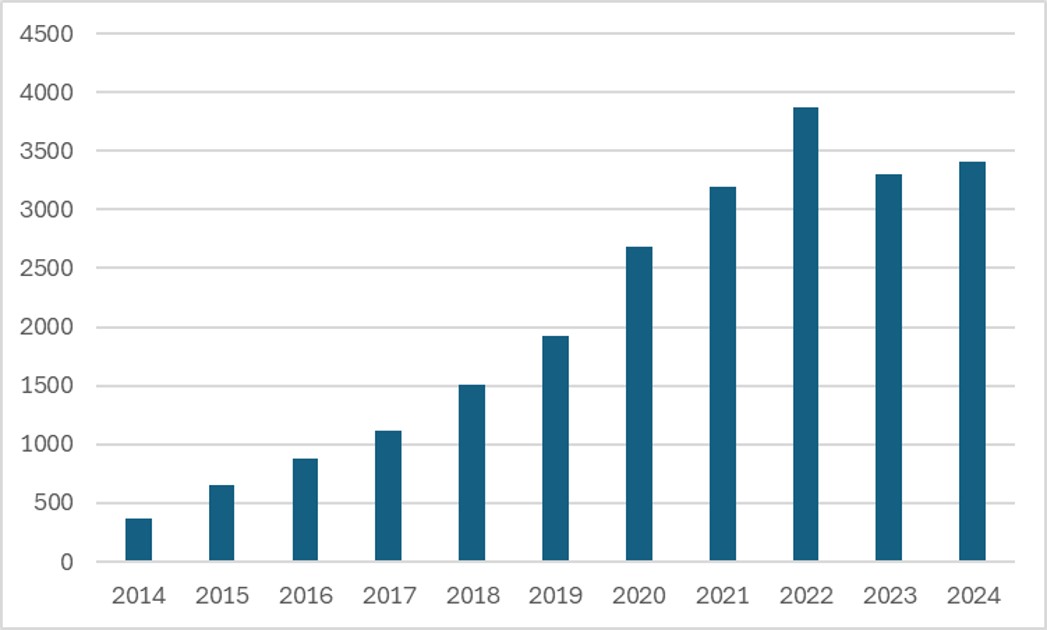
Using Big Data in healthcare could improve patient outcomes, reduce healthcare costs, and support evidence-based healthcare decision-making.
Healthcare systems worldwide are facing growing challenges such as an ageing population and associated disability issues, alongside the rising use of technology and citizens’ expectations. While enhancing health outcomes is undoubtedly a priority, controlling costs is equally vital. In this regard, Big Data holds the potential to assist healthcare providers in achieving these goals in unprecedented ways.
Big Data has the capacity to identify patterns and transform vast amounts of data into valuable insights for precision medicine. Decision-makers are a fundamental aspect of its potential.
In various contexts, the application of Big Data in healthcare already provides solutions that enhance patient care and create value for healthcare organisations. However, for this approach to succeed, all key stakeholders must collaborate and adapt the design and functioning of their systems. For instance, technological frameworks must be developed to accommodate and consolidate the significant volume of healthcare data. Moreover, investment in human capital is necessary to assist citizens as they navigate this new realm of human health and well-being.

Big Data analysis is a complex process that involves the integration of diverse types of electronic data. In recent years, there has been a significant growth in the number of new platforms, tools and methodologies for storing and structuring such data, accompanied by a substantial increase in publications on Big Data and Health (see Figure 1).
Data sources now include electronic healthcare records, patient summaries, clinical trials, telemedicine, genomic and pharmaceutical data, social media, mobile apps, and sensors. This extensive collection of data offers significant benefits to healthcare professionals. Recent reports indicate that the US healthcare system stored approximately 150 exabytes of data in 2011, with projections indicating the potential to reach the yottabyte (1) – that’s 1 million times more data.
Collecting individual data elements and then fusing heterogeneous data from multiple sources can yield significant advancements in healthcare. This approach has the potential to provide valuable insights into disease causes and outcomes, identify more precise drug targets for precision medicine, and enhance disease prediction and prevention. This represents a substantial opportunity for both patients and the healthcare system.

Figure 1: Number of publications on “Big Data and Health” from 2014 to 2024 (MEDLINE search).
The Promising Impact of Big Data on Healthcare in the European Union
The EU is facing several changes that may impact the sustainability of its healthcare system. Life expectancy is expected to increase further this year, meaning more people will live longer but not necessarily in a healthy or active condition. This is likely to put further pressure on Europe’s healthcare costs and economic productivity.
Data sharing has the potential to improve patient outcomes and support evidence-based healthcare decision-making (2). The use of Big Data in the healthcare sector can contribute to this in several ways. (3). Primarily, using Big Data can result in earlier diagnosis and more effective treatments, leading to more successful outcomes: reduction of adverse reactions, and better treatments; disease prevention through identification of risk factors; enhanced pharmacovigilance and patient safety by enabling more informed medical decisions based on information given directly to patients; predicting outcomes.

Big Data has the potential to provide new insights into the risk factors that lead to disease, thus allowing for more personalised care through closer engagement with patients and the import of data from mobile health applications and connected devices.
This data can be analysed and used in real-time to prompt changes in behaviours that can reduce health risks, harmful environmental exposures or optimise health outcomes.
Big Data can support healthcare professionals in identifying high-risk patients and implementing effective interventions promptly, leading to cost reductions and enhanced outcomes (4). Managing this data effectively can facilitate precision medicine by detecting different patient responses to treatments and tailoring healthcare to the specific needs of individuals (5).
All these aspects should eventually lead to improved efficiency and cost containment for the healthcare system.
Big Data in Public Health: Opportunities and Challenges
In the EU, there is a strong focus on using data and new information technology to improve public health and achieve socio-economic goals.
The e-health platforms that many European governments are implementing can help manage chronic patients by interfacing between different health professionals, specialists and patients. Furthermore, a large part of EU citizens use the internet to look for health information and access health services.

Big Data and predictive analytics can also contribute to precision public health by improving public health surveillance and assessment.
Therefore gathering very large amounts of data is invaluable for epidemiological research, analysis of population health needs, evaluation of population-based interventions and informed policymaking (3).
A significant number of projects across the EU are exploring the potential of available Big Data in a wide range of fields – for instance, MiWear is part of the ‘Towards the Healthcare Continuum’ consortium. In this regard, the joint Big Data Task Force of the European Medicine Agency and the Heads of Medicines Agencies has proposed 10 priority actions for the European medicines regulatory network to make the best use of big data to support innovation and public health (6).
Guido Rasi, EMA’s Executive Director said: “I look forward to working with the European Commission and national competent authorities to see how these concrete proposals can be implemented to better harness the potential of big data. This will help to further strengthen the robustness and quality of the evidence upon which we take decisions on medicines” .

Navigating Ethical and Legal Challenges in Big Data for Healthcare
Using Big Data in healthcare brings new ethical and legal challenges due to the personal nature of the information involved. There is a risk of compromising privacy and personal autonomy, and public demand for transparency, trust and fairness when using big data (7). Key technical and infrastructural issues include data heterogeneity, data protection, analytical processes and lack of appropriate infrastructure for data storage.
The EU Data Protection Regulation (GDPR) aims to strike a balance between the protection of patient privacy and the sharing of personal health data for both clinical research and patient care. The Consultative Committee of the Council of Europe’s data protection convention adopted “’Guidelines on the protection of individuals regarding the processing of personal data in a world of Big Data” (8), the first document on privacy and Big Data to provide suggested measures for preventing any possible negative effects of the use of Big Data on human rights and freedoms.
It is therefore imperative for governments using Big Data in the health sector to implement affirmative policies that safeguard the confidentiality, privacy and security of individuals’ health data. At the same time, governments must ensure that advancements in science can be leveraged for the benefit of the community through the open use of data.
- Laura Avogaro from FRESCI
- No Comments
Bibliography
- Raghupathi W, Raghupathi V. Big data analytics in healthcare: promise and potential. Health Inf Sci Syst 2014;2:3.
- Boccia S, Pastorino R, Giraldi L. Digitalisation and Big Data: implications for the health sector, Policy Department for Economic, Scientific and Quality of Life Policies. 2018 http://www.europarl.europa.eu/RegData/etudes/IDAN/2018/619030/IPOL_IDA(2018)619030_EN.pdf
- European Commission. Study on Big Data in public health, telemedicine and healthcare. 2016. https://ec.europa.eu/health/sites/health/files/ehealth/docs/bigdata_report_en.pdf%0A%0A
- Bates DW, Saria S, Ohno-Machado L, et al. Big Data in health care: using analytics to identify and manage high-risk and high-cost patients. Health Aff 2014;33:1123–31.
- Hopp WJ, Li J, Wang G. Big Data and the precision medicine revolution. Prod Oper Manag 2018;27:1647–64.
- HMA-EMA Joint Big Data Taskforce Phase II report: ‘Evolving Data-Driven Regulation ’1. 2019. Available at: https://www.ema.europa.eu/en/documents/other/hma-ema-joint-big-data-taskforce-phase-ii-report-evolving-data-driven-regulation_en.pdf
